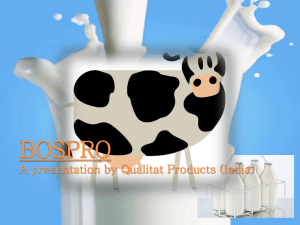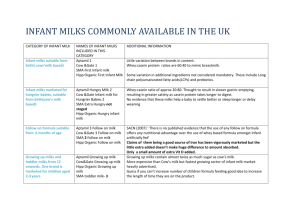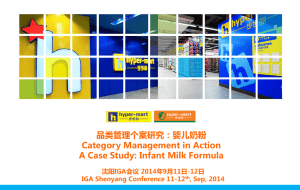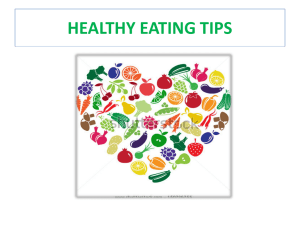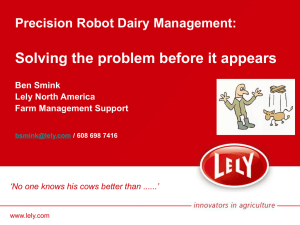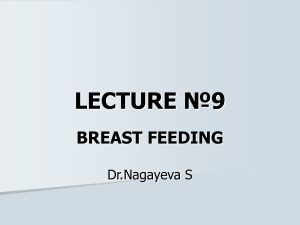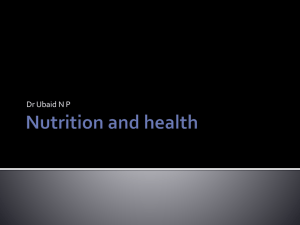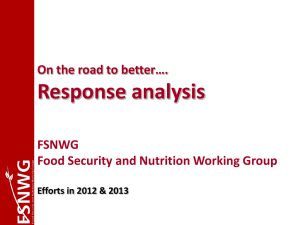Infant formula - steppyorks.nhs.uk
advertisement
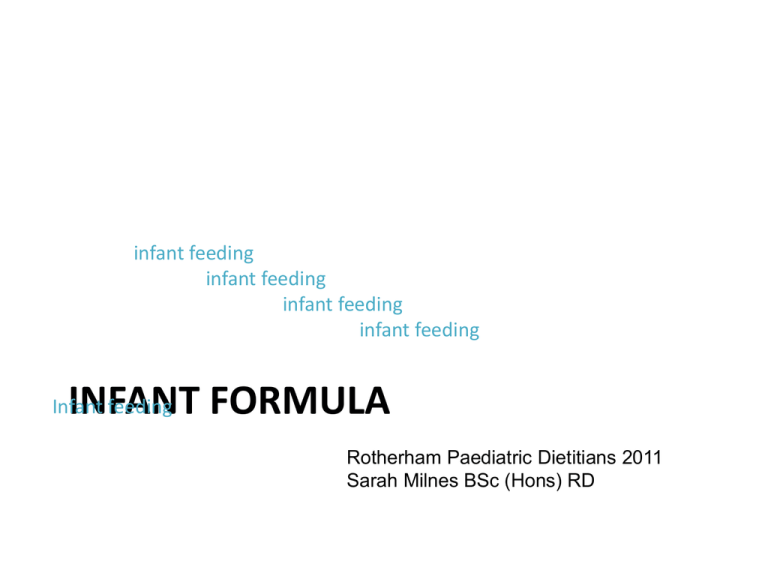
infant feeding infant feeding infant feeding infant feeding INFANT FORMULA Infant feeding Rotherham Paediatric Dietitians 2011 Sarah Milnes BSc (Hons) RD Whats in cow’s milk Protein composition Whey Alpha -lactablumin Beta –lactaglobulin Most likely to cause production of IgE antibodies Heat sensitive - therefore may be able to tolerate evaporated, boiled or sterilised milk, UTH and milk powder Casein Heat stable Sugar Lactose Iron Additions to formula LCP (long chain Polyunsaturates) Omega-3 DHA Omega-6 AA Brain development, nervous system, eyesight Prebiotic Also known as Oligosaccharides or polysaccharides Non-digestible carbohydrates Nutrients for gut flora such as Bifidobacteria lactobacilli Examples as FOS( fructo-oligosaccharides), GOS (galactooligosaccarides), inulin, transgalacto-oligosaccharides and lactulose Nucleotides Support Immune system Improve growth Improve gut bacteria Alpha- Lactalbumin Whey protein Reduced beta proteins therefore more like breast milk Cow & Gate Breastmilk fortifer Nutriprem Breast milk fortifier Preterm – under 2000g Nutriprem 1 Preterm -above 2000g Nutriprem 2 Milupa Aptamil SMA Breast milk Fortifier Aptamil Preterm SMA Gold Prem 1 SMA Gold Prem 2 Ex-prems discharged from RFT SCBU that have not had catch up growth are discharged on Nutriprem 2, with progress monitored by Rotherham paediatric dietitians. It should only be used until 26 weeks actual age. Cow & Gate Milupa Aptamil SMA HIPP First Infant Milk Aptamil First Milk SMA First Infant milk Hipp Organic First milk First milk (whey dominant) First milks/Stage 1 used for the first year - no need for stage 2, stage 3 …… Second Milks “Hungry Baby” (Casein Dominant) Infant milk for the hungrier babies Hungry milk SMA Extra Hungry Infant milk Hipp Organic Hungry Infant Cow & Gate Milupa Aptamil SMA HIPP Follow on From 6 months onwards Follow on milk Aptamil Follow on Milk SMA Follow on Milk Hipp organic follow on Milk One year plus Growing up milk for toddlers / milk for 2-3 years Aptamil Growing Up milk +1 year / +2 years SMA Toddler Milk Hipp Organic Growing up When all you need is cow’s milk Cow & Gate Milupa Aptamil Good night milk HIPP HiPP Organic Good night milk Contains rice & buckwheat High calorie 100% whey milks Cow & Gate Comfort Aptamil Comfort Other milks – all not recommend Soya infant formula only for over 6 month of age but ideally not before 12 months therefore no need for soya formula Goats milk NEVER as banned in EU and UK Rice Milk Not to be used in under 5’s due to high level of arsenic Formula Feeding Problems Constipation Check it is constipation Return to whey dominant formula Check feed concentration* Advise extra cooled boiled water Refer to GP Sugar should not be added to drinks or feed Take care not to compromise growth by giving too much cooled water Colic Check bowels Check feeding position Check feed concentration* Check winding method Check over feeding Check teat size observe a feed (HV or Midwife) Offer support/self help groups Feeding diary Some parents find colic preparations helpful Excessive possetting Check for over feeding Support and reassure Observe feed Review weight gain Examine feeding position Feeding Diary Refer to GP if possetting is excessive and weight gain is inadequate Poor weight gain Check formula preparation* Check amount and frequency of feeds Observe feeds Refer to GP/CMO if appropriate * Care should be taken to ensure that a good standard of hygiene is maintained when making up feeds, and that manufacturers guidance is followed to ensure the correct concentration of feeds once reconstituted (usually 1 scoop of powder per 1 fluid ounce / 30mls water). Apple Kcal in 1/4 Kcal in ½ Kcal in an apple 15 kcal 30kcal 60kcal Kcal in 2 teaspoon Baby rice Formula Kcal in 3 tblespoons Kcal in 6 tblespoons 15kcal 56kcal 112kcal Kcal in 30ml Kcal in 90ml kcal in 120ml 20 kcal 60kcal 80kcal Weaning update Exclusive breastfeeding from birth until weaning is the optimal way to feed young infants. Continuing breastfeeding throughout weaning may reduce the risk of coeliac disease and allergy, and gives ongoing protection against infection even with 2 feeds a day. Term infants should begin weaning around 6 months (26 weeks) but never before 4 months (17 weeks). Baby – led weaning is popular with some parents. Infants should all be considered individually as they develop at different rates. Potentially high allergen foods such as egg, fish, milk used in foods and cooking, cheese, yoghurt, wheat and other gluten containing cereals do not need to be delayed until a certain age. Preterm infants need special consideration and are not included in government weaning guidelines. Signs of readiness to start weaning are usually present between 5 and 7 months after their actual birth date (BLISS 2008). Breast milk 2 years Fe rich foods 7/12 weaning 17 weeks the earliest for weaning 6 months ‘Sour ‘ veg and finger foods around 8- 9/12 Birth 1 year Family food 3 meals & 3 snacks Progress on to lumpier food faster when solids introduced nearer 6/12 First milk Preterm Formula till 26 wks actual age or stopped earlier if growth between 25-50th C Cow’s milk as a drink, 500 -600ml/day First milk can be used till 1 yr corrected Cow’s milk as a drink, 500 600ml/day Vit D supplements for all– Abidec, Healthy start Vitamins, OTC till 5 95% of infants should be 100% happy on the above
